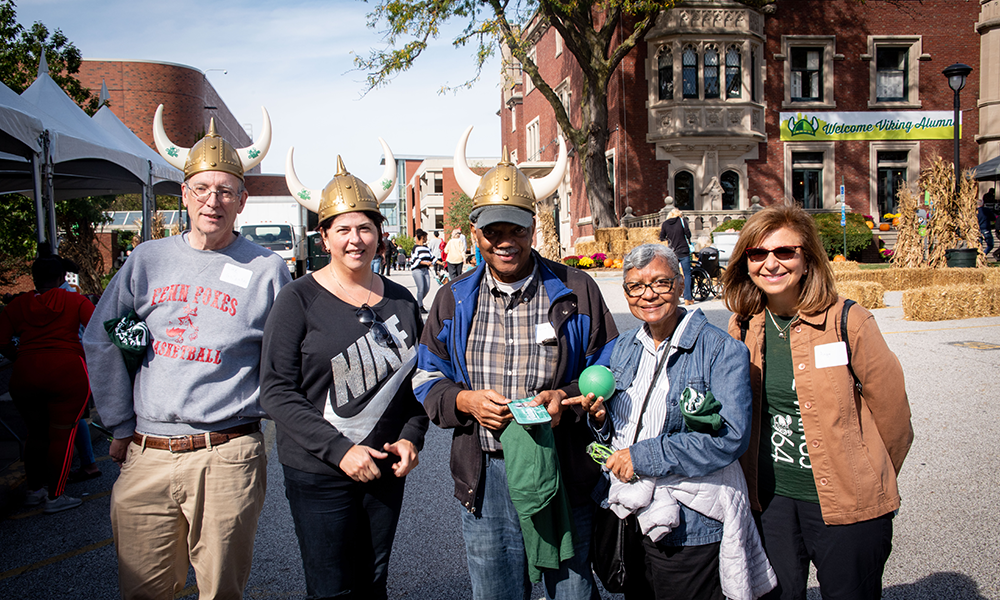
Look for the silver lining
Two alumni share their thoughts on remaining grateful and cracking a laugh or two even during some of life’s trying moments.
30 days to a more grateful outlook
 Lisa Ryan (BBA ’95, MBA ’98) says gratitude is not just a good idea, it’s essential to life. She should know. Years ago, she used it to rebound from depression and job loss and shift into her work as a successful appreciation strategist and certified speaking professional.
Lisa Ryan (BBA ’95, MBA ’98) says gratitude is not just a good idea, it’s essential to life. She should know. Years ago, she used it to rebound from depression and job loss and shift into her work as a successful appreciation strategist and certified speaking professional.
She recommends taking one to two minutes a day to implement one of the following three tips. Start with the goal of 30 days to get into the habit.
Keep a morning gratitude journal. Each morning, write down three to five sentences beginning with the phrase “I am grateful for.…” On bad days when things aren’t going well, look back at old entries to remind yourself of the good in your life.
Keep a wins journal. Each night before bed, write down five positive things that happened that day.
Practice the ABCs of gratitude. Go through the alphabet and focus on people, events and things you’re thankful for that start with each letter. She calls it a miracle, drug-fee way to fall asleep.
Ryan recommends keeping a journal without dates. That way, if you ever miss a day or fall out of the habit, you can just pick it back up and not worry about how much time has passed.
“[Research shows] that people who have a gratitude practice are awake less time before they fall asleep, they sleep more soundly and they awaken more refreshed. So what’s the moral of that story? Count your blessings, not sheep,” she says.
Four more ways to express appreciation
During the 30-day challenge, implementing one or more of the following ways to express appreciation:
- Verbally express gratitude to people, especially people who aren’t thanked often, such as your coffee cashier at the drive-through window.
- Write a letter of appreciation for someone because they are important to you.
- Write a thank you note to someone that did something nice for you.
- Meditate or reflect on the power of gratitude.
Ryan uses the acronym “SHOW” to illustrate four areas that can be improved by implementing her gratitude challenge.
S: Self
Having an attitude of gratitude rewires your brain to look at life more positively, even in challenging times.
H: Health
“We take our health for granted until we don’t have it,” she says.
Five minutes spent in anger reduces the effectiveness of your immune system for six hours, but those same five minutes spent in compassion elevates your immune system for six hours. And employing an attitude of gratitude even helps regulate your heart rate, as opposed to the fast, jagged heartbeats of a person experiencing stress.
To reduce that stress, Ryan recommends the 4-7-8 method: breathe in for four seconds, hold for seven seconds, release for eight seconds. Repeat at least five times.
O: Relationships with others
Ryan says, if you can say something nice about someone, do so.
Put kind notes to your spouse or kids in their lunches.
Send a text to a friend to keep in touch.
Follow the Platinum Rule: make connections by treating others the way they want to be treated.
To help remain grateful even during this pandemic, Ryan says to reflect on the positive benefits of this time. Are you working from home? Are you traveling less (or not at all)? Are you spending more time with your children? Are you enjoying Zoom calls with faraway friends and family members?
W: Wealth or workplace
In the workplace, Ryan encourages compassion, empathy and the sharing of ideas, not just about work but understanding on a personal level how people are doing and asking how you can support them. She also says to acknowledge excellence and let people know you appreciate them.
Ryan hopes that by the end of the 30 days, people will choose to continue the practice. But if you ever stop, you can always pick it back up.
“It doesn’t matter how much time has passed.”
Laughing through life
 Comedian and U.S. Coast Guard veteran Jim Tews (BA ’10) was walking across a New York City street in September 2018 when a car ran a stop sign, hit him, then kept going. He lived to joke about the accident, starting that day with the paramedics.
Comedian and U.S. Coast Guard veteran Jim Tews (BA ’10) was walking across a New York City street in September 2018 when a car ran a stop sign, hit him, then kept going. He lived to joke about the accident, starting that day with the paramedics.
“I remember telling them ‘you don’t have to take me to the VA because they’ll probably stitch me up with yarn.’”
There weren’t any cameras in the area and the driver was never found.
“Once I realized I was okay, what I really wanted was video… I didn’t necessarily care that they caught the guy, I just wanted to see what I looked like getting hit by a car.”
Even in the aftermath of an accident that could have been much worse, Tews finds humor in everyday life and uses it to get through tough times. Here he shares five tips on how you can, too.
Find your comedy comfort food. Tews fills up on old episodes of Cheers and Taxi. “There’s a lot of great new comedy you can watch to distract yourself, but there’s something more soothing about watching a show that doesn’t use cell phones in a storyline.”
Learn to laugh at yourself. “It happens to be my coping mechanism that I’ve turned into a career. We’re all ridiculous beings.”
Share your most embarrassing stories with people you love. “This is pretty connected to number two, but I spend a lot of time around my peers who regularly do embarrassing and mildly improper things. Being able to share those stories is cathartic. Just know your audience. This might be a better activity for a family gathering as opposed to a work meeting.”
Laugh at a stranger when they’re well out of earshot. “Feel okay about it, knowing a stranger will one day do that to you.”
Get a cat or a very goofy dog. “I laugh more at my animals than pretty much anything else. They’re hilariously shameless and unaware.”
Also in this Issue...
A Homecoming Like No Other
The year 2020 was certainly one for the history books. A global pandemic. Remote learning and working. Shutdowns. Face masks. Social distancing. And CSU’s first-ever virtual Homecoming. Read more >>
How COVID-19 Shifted the work of the CSU Alumni Association
As a result of the world’s shift to virtual connection as a primary source of interaction, the CSU Alumni Association developed a number of programs to engage with alumni both near and far. Read more >>>
Deep Connection, Keen Perception Prompt Major Gift
Alumna Marjorie Shorrock gave $1 million gift in support of CSU’s recently established Student Success Initiatives. Read more >>



